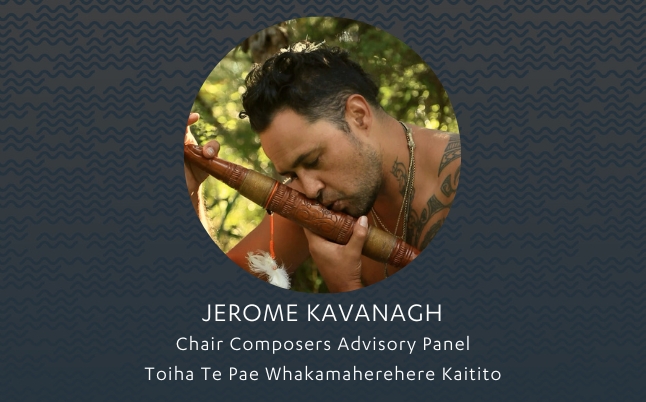Give a brief introduction about yourself.
Ko Ruahine to Pae Maunga
Aorangi te Maunga Tapu
Rangitikei te awa
Makokomiko te Kainga
Waiokaha te marae
Te Tini a Haa me Honomokai aku hápu
Ko Jerome Toku ingoa
I come from Kahungunu , Ngati Rangi, Awa Whanganui , Tuwharetoa , Matakore Maniapoto iwi. I also have whakapapa to Eire (Ireland) to the Caomanach hapu.
What do you do outside of your work at SOUNZ?
I am father of 6 tamariki and a full time Taonga Puoro Practioner/ composer / artist. I am Pou Tane and co-Director of our family business Huia Ltd alongside my Hoa Rangatira & Pou wahine Ruiha. I like spending time in our maara (veggie garden) at home, so part-time Gardener also :)
What is one of your earliest musical memories?
My Kuia showed me a pupurangi after we had just had a kai on them, and she planted the seeds of Taonga Puoro in my heart and mind. Back then, in the 80s, we didn't hear the words Taonga Puoro at all. She showed me this small shell and said these are our musical instruments. I grew up rurally, and the first whare I lived in had a polished dirt floor in a place called Moawhango. We grew up walking the Whenua, spending lots of time playing by the river, helping out in the maara, and climbing trees listening to the songs of Korimako, Tui, Kereru, and Piwaiwaka. The sounds of our environment would be my first musical influence.
What do you think makes the music of Aotearoa, New Zealand, unique?
The Taiao and the way our people connect and relate to the Taiao. When I think of the music of Aotearoa, I go straight to Taonga Puoro as our first musical instruments of this Whenua, unique to our Whenua but also closely connected to the musical approach of all indigenous people globally.
Provide a brief overview of your personal journey with music.
Music to me has always been part of my life growing up within our culture connected to our environment and my whanau. It was and still is an integral part of my everyday life. I first recognised myself as Musician in a Western sense when I decided that I would only mahi with Taonga Puoro and just commit to that as a sustainable practice. In 2003 I decided to be a full-time Taonga Puoro Practioner and weave our Tupuna sound into all parts of society, health, education, and entertainment.
Just before 2003, In my early 20s, I had a mental breakdown, went into depression, and had several suicide attempts. My whanau took me back to the ngahere to heal, I started to get better by listening to the sounds of the forest and making and playing Taonga Puoro. Once I was well again and had enough to share, I began touring around our Kura and Kohanga, sharing what I had learned with our tamariki and whanau within our rohe.
I then went overseas and toured South America, lived in Argentina, then London, and lived there for 5 years. I've lived in several countries, including South Africa, Indonesia, and Australia, all the while as a Taonga Puoro artist, which was super challenging but super rewarding.
During that time overseas, I co-wrote a song with an LA producer Chris Tin. We wrote the song in Te Reo Maori and included Taonga Puoro alongside classical music. I featured on that track also as a Solo Chanter and utilised our whaikōrero style of vocal in the track. That song was part of an album, and in 2011 that album won 2 Grammy awards.
My mahi has mostly been touring schools sharing Taonga Puoro both here in Aotearoa and overseas, we created the ORO ATUA just over 10 years ago, and that is the modern revival of our Tupuna practice of utilising Taonga Puoro in Hauora and as another form of Rongoa Maori.
Why SOUNZ?
For me and in my own personal experience, SOUNZ is a great organisation because it is inclusive and supportive of Maori and Pacific island music traditions and the cultural practitioners that carry ancestral music. In general, the dominant Music has been of Western influence, and it's great to see the scales being rebalanced to recognise that there is so much more to value.
Why is music important to New Zealand culture?
Here in Aotearoa, just like in the rest of the world, it's very important. I'd say it's important in different ways depending on what culture of Aotearoa you come from and how you might view the world. For me, as Maori, it's important to be able to connect myself to my Tupuna and share with our mokopuna. It is an important taonga to connect to our Whenua ki te Moana. I couldn't imagine a life without Taonga Puoro.
Why is music important in schools?
It's important for the next generation to continue what our Tupuna have left for us. In terms of Taonga Puoro here in Aotearoa, its highly relevant for all of our tamariki of Aotearoa and extremely important for our Tamariki Maori to be able to practice and enjoy their original musical culture.
